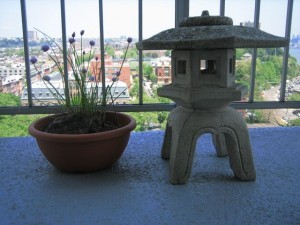
When I moved to an 18th floor apartment in semi-urban Hoboken from a large house in suburban Montclair, I brought with me a nondescript chive plant in a cheap orange pot which was supposed to be reminiscent of clay but was only plastic. I stuck it out on the balcony and left it there. It was a remnant of the world I had abandoned, where I could have an herb garden, walk out my door to pad around on the grass, shoo off the deer or the groundhog.
In exchange for the garden and the space, I have time. No mowing, weeding, pruning, planting. No worries when it snows, rains, and blows. I look out on the Hudson River and the skyline of New York city, and that is as changeable and lovely a view as my garden.
It was hectic fitting this previous life into a two-bedroom apartment, and I forgot about the chive plant. As winter came along, it withered into brown straw, but I didn’t throw it out. It went on to show me life — the withdrawn, dry winter, the easy proliferation of spring, the struggle through summer, and giving up for a while in fall.
This spring, as usual, it unfolded, turning green with ease, popping out multiple balls of purple bloom, spreading its tasty thin green spikes into an arrangement as beautiful as a Japanese flower arrangement.
It doesn’t get any bigger or smaller. It hugs the outer edge of the cheap orange pot without claiming any more ground. It knows its limits, and seems quite content to go on living as the seasons around it dictate.
Here I am trying to put into words the meaning of raggedy, potent reminder that nature untended will rouse itself – it’s the over-tending of nature that is our problem these days.
It’s been here three years now, and I enjoy it as an old friend.